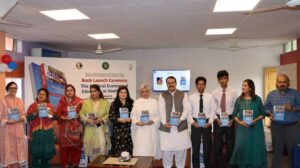Sindh Health and Population Welfare Minister Dr Azra Pechuho on Tuesday deplored that a large number of schools and educational institutions had been severely affected during the devastating floods last year, resulting in extensive delays in their reconstruction.
“Consequently, the education of children attending these schools has been disrupted for a period of 4 to 5 years, which are crucial years for their learning and development. It is imperative for us to embrace e-learning and virtual education as we bring children back into the education system,” she said while speaking at a two-day conference on “Foundation Learning and Early Childhood Care and Education Emergencies”, which commenced here in collaboration with the Sindh government and Unicef.
Dr Pechuho maintained that bringing out-of-school children back into the learning environment is crucial, adding that during the Covid-19 pandemic, children remained confined to their homes, and the government made efforts to ensure their immunization.
Sindh Education Minister Syed Sardar Ali Shah emphasized the role of mothers as the first and best early childhood educators. Early childhood education teachers play a vital role in guiding children towards proper education and the right path, just like mothers, he remarked.
He further stated that he had studied all laws pertaining to education in Pakistan and all provinces, and he did not “find any definition of a school”. Due to this lack of definition, the schools with just one or six rooms were built, he said and expressed disappointment at the fact that no philanthropist had come forward to help in constructing schools, unlike Mir Ghulam Muhammad Talpur, who built schools in Tando Bagho during the 1920s.
“Today, no one is stepping forward to construct schools which were affected during the floods,” the minister added.
Shah mentioned that they had hired sixty thousand teachers based on merit, which was a record achievement. They faced numerous obstacles in the bureaucracy, but with the clear directives from Chairman Pakistan Peoples Party Bilawal Bhutto Zardari and Chief Minister Sindh Syed Murad Ali Shah, they succeeded in recruiting teachers purely on merit.
He said that the process of appointments of lecturers under the Sindh Public Service Commission had been completed, and once colleges reopened in August, the shortage of lecturers would be resolved. He also announced the appointment of 659 early school teachers and plans to hire an additional 1,600 early school teachers. Music teachers would also be hired within 15 days, he added.
Highlighting the significance of formulating education laws, Secretary School Education Ghulam Akbar Laghari mentioned that everyone faced difficulties during the floods, but children were the most affected. School buildings suffered damage, and camps were established for affected students.
Temporary learning centers were set up with the cooperation of UNICEF and other international organisations. Efforts were made during the emergencies to ensure that children’s education remained uninterrupted.
Laghari said this conference aims to discuss how to sustain education during such emergencies, and we must remain prepared for any future emergencies.
During the conference, panel discussions were held among educational experts, where recommendations were presented on how to continue education during emergencies.
The conference was also attended by Sindh Education Minister Syed Sardar Ali Shah, Secretary Education Ghulam Akbar Laghari, Chief of Field Office Unicef Sindh Prem Bahadur Chand, Dr Junaid Samo, Chief Program Manager RSU, Dr Fauzia Khan, Additional Secretary Chief Advisor Curriculum, as well as representatives from Unicef, the World Bank, Save the Children, Idara-e-Taleem-o-Agahi, AKU, and other national and international organisations.




